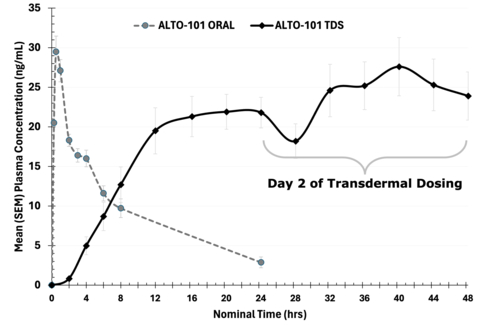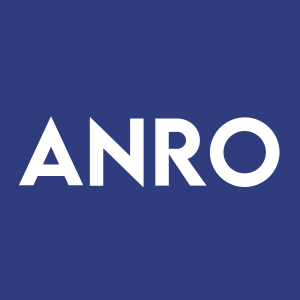Alto Neuroscience Announces Positive Phase 1 Results for ALTO-101, a Novel PDE4 Inhibitor in Development for Schizophrenia
- ALTO-101 demonstrated favorable pharmacokinetic and tolerability profile in Phase 1 study
- Transdermal formulation provided significantly greater drug exposure with fewer adverse events
- Proof-of-concept study for CIAS to start in the first half of 2024
- Topline data expected in the second half of 2025
- Achievement of target exposure with proprietary transdermal patch formulation
- Reduction in typical class-wide adverse events with ALTO-101
- None.
Insights
The recently reported Phase 1 study results for ALTO-101, a PDE4 inhibitor, mark a significant milestone in the development of treatments for cognitive impairment associated with schizophrenia (CIAS). As a PDE4 inhibitor, ALTO-101 works by modulating the activity of the enzyme phosphodiesterase 4, which is involved in the regulation of cyclic adenosine monophosphate (cAMP). This signaling molecule plays a important role in brain functions, including cognition. The ability of ALTO-101 to provide stable plasma concentrations and reduce adverse events through a transdermal delivery system is a notable advancement over existing oral PDE4 inhibitors, which are known for dose-limiting side effects.
From a medical research perspective, the implications are twofold. Firstly, the improved pharmacokinetics suggest that ALTO-101 could offer more consistent therapeutic benefits, which is critical in managing CIAS. Secondly, the observed reduction in adverse events may lead to better patient compliance and tolerability, which historically has been a challenge with this class of drugs. This favorable safety profile, if proven in subsequent trials, could position ALTO-101 favorably among clinicians and patients, potentially impacting the standard of care for CIAS.
Alto Neuroscience's announcement could have a nuanced impact on its financial position and market valuation. The achievement of enhanced drug exposure levels with the transdermal ALTO-101 implies a potential for patent extension strategies and product differentiation in the market. The milestone payment due to development partner MEDRx, valued at <$1.5 million>, in a mix of cash and stock, is relatively modest and suggests a strategic partnership structure that minimizes upfront cash outflows.
Looking ahead, ALTO-101's progress into a proof-of-concept study signifies substantial R&D investments, with topline data expected in the latter half of 2025. For investors, the long-term horizon for commercialization requires a careful balance of the drug candidate's promise against the inherent risks and capital requirements of clinical development. Furthermore, the positive study results may positively influence investor sentiment, although caution is advisable until further efficacy data is obtained. The potential benefits for the company include not only the expansion into the CIAS market but also the technological validation of their proprietary transdermal system which could be leveraged for other pipeline assets.
Considering the biotechnology sector and the treatment landscape for schizophrenia, the development of ALTO-101 reflects growing investment in treatments that improve cognitive impairments, an area often underserved by current antipsychotic medications. Transdermal drug delivery systems (TDS) represent innovative advancements in administering central nervous system (CNS) treatments and offer a differentiated approach to drug delivery that could be particularly appealing for patients with CIAS who may struggle with medication adherence.
Moreover, the CIAS treatment market lacks options, thus a successful entry by ALTO-101 could capture significant market share. The broader relevance of these results lies in the potential application of Alto Neuroscience's transdermal delivery technology to other CNS indications, which may attract partnership opportunities or interest from larger pharmaceutical companies seeking to expand their neurological portfolios. This technology, if licensable, may become a valuable asset and a catalyst for business development activities, which would be of interest to investors looking for growth opportunities within the neurotherapeutics space.
– ALTO-101 demonstrated a favorable pharmacokinetic and tolerability profile; novel transdermal formulation delivered significantly greater drug exposure and fewer adverse events typically associated with PDE4 inhibitors –
– First-in-human achievement of target exposure with proprietary transdermal patch formulation developed in partnership with MEDRx –
– Proof-of-concept study in cognitive impairment associated with schizophrenia (CIAS) to be initiated in the first half of 2024 –

The pharmacokinetic curve illustrates stable drug exposure and achievement of the desired plasma concentration with the transdermal formulation as compared to orally administered ALTO-101. (Graphic: Alto Neuroscience, Inc.)
“These positive results provide a strong indication that ALTO-101 could become an important therapeutic option for a broad range of indications,” said Amit Etkin, M.D., Ph.D., founder and chief executive officer of Alto Neuroscience. “Oral PDE4 inhibitors have shown promise as pro-cognitive therapeutics but are associated with burdensome and dose-limiting side effects. Despite these dosing and tolerability challenges, PDE4 inhibitors are used widely in other non-CNS indications, often with sub-optimal dosing regimens. We have now demonstrated transdermal administration of ALTO-101 results in significantly greater, stable drug concentration with a once-daily formulation that is well-tolerated. We believe the reduction in typical class-wide adverse events observed with ALTO-101 provides a significant point of differentiation compared to other PDE4 inhibitors currently available, or in development. We look forward to advancing this product candidate for patients with CIAS who currently have few treatment options.”
Phase 1 Study Design and Results
The study was designed to evaluate the safety, tolerability, pharmacokinetics, and adhesion properties of a proprietary transdermal formulation of ALTO-101 compared to oral administration of ALTO-101 in healthy human volunteers. It included a 2-way crossover design consisting of two dosing periods. Fifteen adults between 40-64 years old were enrolled in the study. In period 1, participants received a single oral dose of 1 mg ALTO-101, following a 7-day washout period; in period 2, participants received continual transdermal dosing of 18 mg ALTO-101 for two days – patches were administered once-daily and worn for 24 hours. In both periods pharmacokinetics and tolerability were evaluated during and following treatment to measure absorption and elimination.
Topline Results from the ALTO-101 Phase 1 study include:
-
ALTO-101 delivered transdermally resulted in significantly higher, and consistent, drug concentrations compared to oral administration:
-
Area under the curve (AUC) was
62% and170% higher on day 1 and day 2 respectively for the transdermal formulation relative to oral administration (day 1 p=0.01; day 2 p<0.001). - The maximum concentration (Cmax.) on day 2 of the transdermal dosing was similar to the Cmax of 1mg of orally administered ALTO-101 (27.9 ng/mL for TDS vs. 30.1 ng/mL oral).
- Plasma concentrations for the transdermal formulation remained stable throughout the 24 hours of dosing on day 2.
-
Area under the curve (AUC) was
-
ALTO-101 delivered transdermally resulted in substantially lower class-related adverse events typically associated with PDE4 inhibitors.
-
Dizziness -
40% oral vs.7.1% TDS -
Nausea -
20% oral vs.0% TDS
-
Dizziness -
- All adverse events reported in the study were mild in severity, and there were no reported serious adverse events. No participants discontinued the study due to adverse events.
- The transdermal formulation demonstrated favorable adhesion properties and there were no application site reactions that led to patch removal or intolerance.
Overall, the results from this Phase 1 study indicate a favorable profile for ALTO-101 with higher levels of drug exposure, expected to be within the necessary therapeutic range, and lower rates of adverse events. The pharmacodynamic effects observed with orally administered ALTO-101, which were previously reported by the Company, inform the relevant therapeutic range believed to be required to achieve the desired pro-cognitive and clinical effects.
Under the terms of the development agreement between Alto and MEDRx, upon this achievement of the desired pharmacokinetic profile for ALTO-101, MEDRx is eligible to receive a milestone payment of
About ALTO-101
ALTO-101 is a novel small molecule PDE4 inhibitor being developed for cognitive impairment associated with schizophrenia, a disease state defined by negative and cognitive symptoms with no currently available targeted treatments. Through a proprietary transdermal delivery system, ALTO-101 is designed to provide steady state concentrations to improve drug safety, tolerability, and pharmacokinetics. The proprietary transdermal delivery system for ALTO-101 has been developed in partnership with MEDRx. In Phase 1 clinical trials, ALTO-101 demonstrated human brain penetration, robust CNS-relevant pharmacodynamic effects, and was well tolerated across therapeutically relevant dose ranges.
About Alto Neuroscience
Alto Neuroscience is a clinical-stage biopharmaceutical company with a mission to redefine psychiatry by leveraging neurobiology to develop personalized and highly effective treatment options. Alto’s Precision Psychiatry Platform™ measures brain biomarkers by analyzing EEG activity, neurocognitive assessments, wearable data, and other factors to better identify which patients are more likely to respond to Alto product candidates. Alto’s clinical-stage pipeline includes novel drug candidates in depression, PTSD, schizophrenia, and other mental health conditions. For more information, visit www.altoneuroscience.com or follow Alto on X.
Forward Looking Statements
This press release may contain forward-looking statements made pursuant to the safe harbor provisions of the Private Securities Litigation Reform Act of 1995. These statements may be identified by words such as “aims,” “anticipates,” “believes,” “could,” “estimates,” “expects,” “forecasts,” “goal,” “intends,” “may,” “plans,” “possible,” “potential,” “seeks,” “will” and variations of these words or similar expressions that are intended to identify forward-looking statements, although not all forward-looking statements contain these words. Forward-looking statements in this press release include, but are not limited to, statements regarding Alto’s expectations for ALTO-101, the timing for the initiation of the ALTO-101 proof-of-concept trial, and the timing of the readout from the trial. Actual results or events could differ materially from the plans, intentions and expectations disclosed in these forward-looking statements as a result of various factors, including the risk that Alto’s expectations concerning ALTO-101 which could cause Alto’s actual results to differ from those contained in the forward-looking statements, which are described in greater detail in the section titled “Risk Factors” in Alto’s Annual Report on Form 10-K for the fiscal year ended December 31, 2023 filed with the Securities and Exchange Commission (“SEC”) as well as in other filings Alto may make with the SEC in the future. Any forward-looking statements contained in this press release speak only as of the date hereof, and Alto expressly disclaims any obligation to update any forward-looking statements contained herein, whether because of any new information, future events, changed circumstances or otherwise, except as required by law.
View source version on businesswire.com: https://www.businesswire.com/news/home/20240423861340/en/
Investor Contact
Nick Smith
investors@altoneuroscience.com
Media Contact
Jordann Merkert
media@altoneuroscience.com
Source: Alto Neuroscience, Inc.
FAQ
What are the positive Phase 1 results announced by Alto Neuroscience for ALTO-101?
What delivery system was used for ALTO-101 in the Phase 1 study?
When is the proof-of-concept study for cognitive impairment associated with schizophrenia (CIAS) expected to start?
What is the expected timeline for the release of topline data related to ALTO-101?







